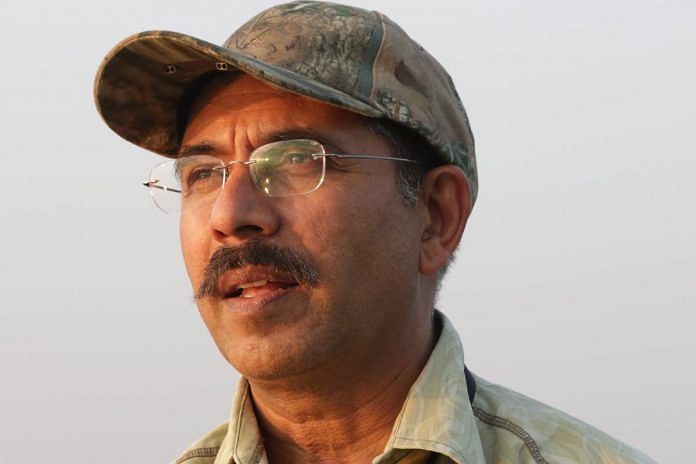New Delhi: The government unexpectedly terminated veteran conservationist Y.V. Jhala’s contract with the Wildlife Institute of India Tuesday, effectively ousting him from the cheetah introduction programme that he devoted over a decade of his career to. His two year extension as dean and senior scientist with the institute was curtailed to one year, ending 28 February.
Confirming the termination of his contract to ThePrint over phone, Jhala said, “I have no idea why the government has taken this decision. I don’t know what went wrong, but it’s their prerogative.”
He added: “I’m disappointed with what has happened. I’ve done everything by the book.”
India’s cheetah introduction programme has been decades in the making, and aims to re-establish populations of free-ranging cheetahs as they existed before becoming extinct in the country in 1952.
Jhala has played a key role in designing the programme and bringing cheetahs from South Africa and Namibia to India. Apart from the Wildlife Institute, the National Tiger Conservation Authority (NTCA) and Madhya Pradesh forest department are involved in executing the project, with expert guidance from Namibia’s Cheetah Conservation Fund and South Africa’s Metapopulation Initiative, among others.
Sources involved with the project have said Jhala’s removal has caused some apprehension. The plan to rehabilitate cheetahs has drawn controversy among conservationists across the world, who have argued that translocating cheetahs to establish a free-ranging population is risky, costly, and takes away from other conservation efforts.
“There are legitimate concerns about the project, and they are concerns I know how to address. If this project isn’t executed properly and it fails, those critics will be right. It’s a globally watched project, and if it fails, something like this will never be attempted again,” said Jhala, adding, “I hope the government knows what it’s doing.”
A senior government official in the Ministry of Environment, Forests and Climate Change said there was no malintent involved in his termination, and that the step was taken as part of a routine drive for fresh recruitments at the Wildlife Institute.
“This is in no way diminishing his contributions to the programme. He is a well-respected scientist, and he will be given due positions and consulted as and when the need comes up,” said the official, adding, “His extension was of a temporary nature since he was a retired person. The Wildlife Institute is recruiting more scientists, and this is a step to fill vacancies in the Institute.”
Asked about what this means for the leadership of the cheetah project, the official said, “There are several experts on the ground who are working day in and day out to monitor the project, and that will continue.”
The curtailment of Jhala’s tenure follows his exclusion from a government-appointed cheetah task force, created in September last year by the National Tiger Conservation Authority to monitor the cheetahs after their arrival.
Also read: After US scientists, WMO too says El Niño could raise temperatures globally later this year
‘Without him, there’s a hole’
According to a source involved in the project, who did not wish to be named, the governments of Namibia and South Africa had placed confidence in the project owing, in part, to Jhala’s leadership.
While Jhala accompanied the cheetahs from Namibia last year, he was not permitted to do so from South Africa, it is learned.
“Everybody wants this project to succeed, but scientists have to be at its forefront. We have to be able to make as many observations and inferences as we can, and gather as much data as we can, without interference by management,” said the source, adding, “Jhala is well respected in South Africa and Namibia. Without him, it feels like there is a hole.”
On 16 February, Jhala, veterinarian Adrian Todiffe, along with other scientists involved with the programme published an article in the journal Nature Ecology and Evolution, defending the project amid criticism and saying there was sufficient data to “support the experimental reintroduction of cheetahs into India”.
“Recent media headlines show that the cheetahs have already positively captured the attention of the Indian public and politicians, a critical component for the project’s success. Their role as an umbrella species, benefiting broader biodiversity conservation and livelihood goals in India — although supported by theory — will need to be evaluated after the cheetah is reintroduced and established in India,” the article says.
Another source involved with the project said, “We’ve worked very hard to make sure this plan works no matter what, and we have to keep looking forward.”
‘Cheetahs adjusting well’
The first batch of eight cheetahs were brought from Namibia in September 2022, and a second batch of 12 cheetahs arrived from South Africa last month. The first batch is currently in large fenced enclosures, while the second batch is in quarantine.
Vincent van der Merwe, cheetah expert with Metapopulation Initiative, said the cheetahs have adjusted well to their new environment and will remain in quarantine till mid-March at least.
“The logistical support by Indian Air Force transport aircraft and helicopters allowed for the relocation to be wrapped up within 24 hours,” he said.
According to the agreement signed with South Africa, India will receive 12 cheetahs every year for the next eight to 10 years for the purpose of establishing a viable metapopulation within the country.
(This is an updated version of the copy.)
(Edited by Poulomi Banerjee)
Also read: India sees warmest February in 122 yrs & IMD says respite from heat unlikely in coming months



